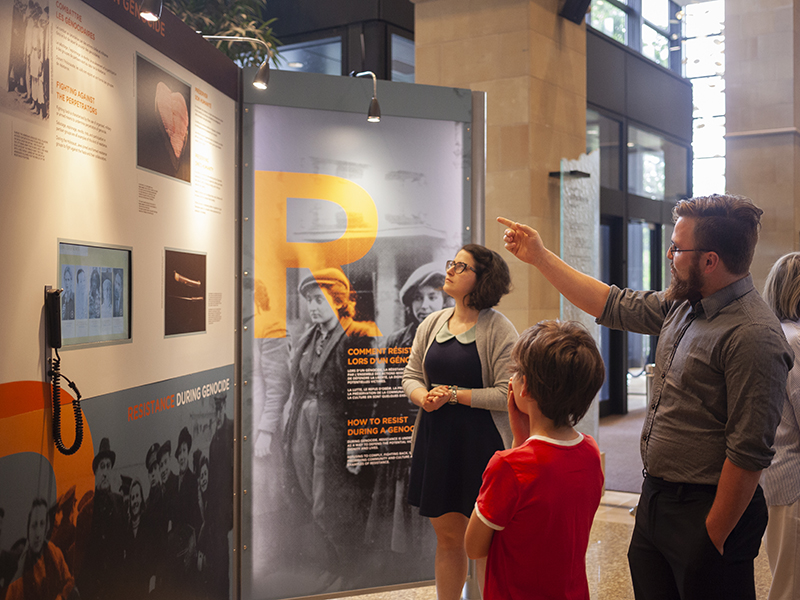Two Canadian architectural firms have been chosen to design the new Montreal Holocaust Museum (MHM), a $90-million project scheduled to be completed in September 2025.
The joint proposal submitted by KPMB Architects of Toronto and Montreal-based Daoust Lestage Lizotte Stecker is the winner of an international competition launched last fall. Their design was selected from the 32 anonymous proposals from nine countries that the MHM jury received, which were narrowed down to four finalists.
The design will be unveiled publicly on Sept. 8.
The greatly enlarged museum will be downtown, in a building to be constructed at 3535 St. Laurent Blvd., relocating from Federation CJA’s Cummings House in the west end Côte des Neiges district where the MHM has been since its founding in 1979.
“In light of the objectives and evaluation criteria set out in the competition rules, this project stood out in particular for its integration into the urban context, the clarity of its organization of spaces and the integration of gardens into the museum experience,” the jury stated.
The jury also noted that this team had a strong understanding of the MHM’s mission and had approached the subject “with great sensitivity.”
KPMB has been awarded 18 Governor General’s medals since it was founded in 1987. Among its recent projects is the restoration of Toronto’s historic Massey Hall.
Daoust Lestage Lizotte Stecker designed the National Monument to Canada’s Mission in Afghanistan, dedicated in Ottawa last year.
The new MHM will be constructed on a 20,000-square-foot lot on St. Laurent, north of Sherbrooke Street, chosen for its proximity to the Quartier des Spectacles and what was once the Jewish immigrant neighbourhood.
Following the Sept. 8 unveiling, all the projects received in both the initial and final stages of the competition, as well as the jury’s reports, will be published.
The jurors were MHM representatives and experts in Holocaust history, museology, architecture and landscape architecture: jury president Izabel Amaral, director of the School of Architecture at the Université de Montréal; Vedanta Balbahadur, architect with Studio Vedanta Balbahadur; MHM executive director Daniel Amar; Giovanna Borasi, director of the Canadian Centre for Architecture; Concordia University history professor Frank Chalk, founding co-director of the Montreal Institute for Genocide and Human Rights Studies; Isabel Hérault, architect with Hérault Arnod Architectures in Paris; Holocaust survivor Eva Kuper, member of the MHM board of directors; landscape architect Philippe Lupien of Lupien et Matteau and Université du Québec à Montréal professor; and Sophie Robitaille, landscape architect and urban designer with RobitailleCurtis.
The project is receiving funding from three levels of government: $20 million from Heritage Canada, $20 million from the Quebec Ministry of Culture and Communications, and $1.5 million from the City of Montreal.
The Azrieli Foundation is the lead private donor with a $15 million contribution. The MHM says 91 percent of the $90-million goal of its Give Voice campaign has been reached.
News of the project’s progress comes at a time when there are renewed calls for better Holocaust education in Quebec schools, prompted first after a survey found Quebecers have a weaker knowledge of the Holocaust than other Canadians and then, earlier this month, when the lawyer defending a man on trial for hate speech against Jews made arguments raising doubts that the extermination of Jews was a consequence of Nazi ideology.
In June, a survey conducted by the Association for Canadian Studies and Leger Marketing showed that significantly more francophone Quebecers than others assessed their knowledge of the Holocaust as insufficient: 36.5 per cent compared to 13.1 per cent of non-francophones. Overall, about one in four Canadians surveyed described their Holocaust knowledge as weak.
On July 8, lawyer Hélène Poussard shocked the Jewish community with her remarks during the trial of Gabriel Sohier Chaput, an alleged neo-Nazi charged with willfully promoting hatred against an identifiable group. She attempted to make the case that the Holocaust was an “economical solution” resorted to because “someone close to Hitler” thought it was cheaper than keeping Jews in concentration camps or deporting them. She said she learned that in school.
“It wasn’t part of the initial plan (of Nazism) to exterminate Jews,” Poussard said. “And was it really six million victims? I believe that if people died in concentration camps, it was to save money.”
The Centre for Israel and Jewish Affairs (CIJA) is calling on Education Minister Jean-François Roberge to include the history of the Holocaust and “antisemitism awareness” in the curriculum of the province’s schools.
“Poussard’s statement is the straw that breaks the camel’s back,” said CIJA Quebec vice-president Eta Yudin.
“Despite some teachers proactively including Holocaust education in their history or literature curriculum, Holocaust history is not part of the required curriculum in Quebec schools.”
The recent survey confirms a trend that year after year fewer Quebecers and Canadians know about the Holocaust, she added.
The Holocaust is touched upon in the compulsory Contemporary World course given in Grade 11. Anything more is generally left up to individual teachers. Critics say that is far from enough.
The education ministry this year published a pedagogical guide to teaching about 20th-century genocides that will be made available to all high schools, but its use is at the discretion of educators.
Written by two academics, the guide is the result of years of lobbying by the Foundation for Genocide Education, created by Heidi Berger, a child of survivors, with the participation of the MHM and other communities affected by genocide.
In June the MHM held a full-day training seminar on teaching the Holocaust and genocide in English and French, as well as a half-day virtual seminar earlier this month.
